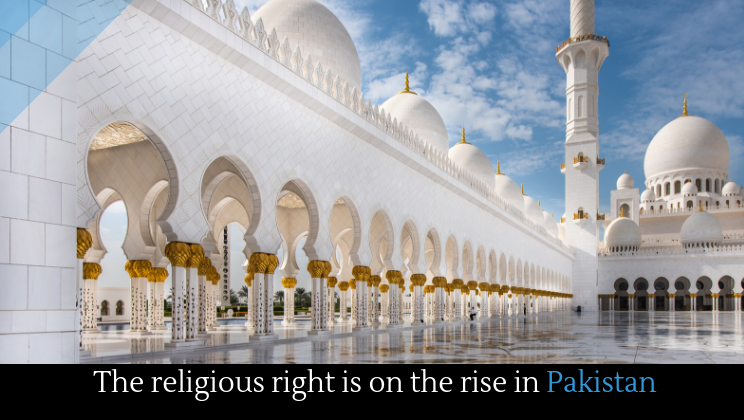The religious right is on the rise in Pakistan
Posted by Josh Taylor / November 3, 2018
In 2010, an illiterate Christian farmhand named Asia Bibi got into an argument with a Muslim neighbor. It’s hard to tell exactly what happened, because the inciting incident has become something of a legend. The gist of the situation appears to be that Bibi drank water from the same cup that her Muslim neighbors were about to use. Her neighbors did not want to share the same drinking vessel as a non-Muslim, and the women got into an argument. During the argument, Bibi allegedly blasphemed the prophet. Blasphemy is a crime in Pakistan, so as a result of her alleged blasphemy, she was arrested and imprisoned. After eight years, she has been released.
Now that she’s been released, protests are spreading across the country. “In public speeches, [Khadim Hussain Rizvi, the leader Pakistan Tehreek-e-Insaf government] has said his only demand is that the mother-of-five be put to death, the punishment for blasphemy under Pakistan’s penal code.” Those who have defended Bibi, both politicians and lawyers, have been protested, harassed, and even killed. Religious and humanitarian organizations from around the world have rallied around Bibi, and she has been offered asylum in several different countries. There is a literature professor who is still being held on allegedly false accusations of blasphemy. He has been imprisoned since 2013.
According to Mohammad Hanif, Pakistan’s blasphemy laws are more closely related to Hindu caste practices than Islamic scripture or jurisprudence. This is up for debate. The original blasphemy laws were instituted by the British, long before Pakistan and India were partitioned. The British leadership in the Indian colonies used the law to curtail sectarian religious violence, specifically relating to issues surrounding the Prophet Muhammad. The belief that sharing water from the same cup as an unbeliever is polluting does have much in common with Hindu notions of purity and pollution, which dictate that certain substances (especially bodily fluids) are highly polluting. However, the sensitivity over the Prophet is longstanding. This level of sensitivity is best considered a regional variation and not standard orthodoxy for Islam on the whole.
Bibi’s arrest, imprisonment, release, and the subsequent protests have the potential to fan the flames of anti-Islam and anti-Muslim sentiment already blazing in the western world. Western liberals, especially outspoken liberals like Sam Harris and Bill Maher, far from espousing tolerance portray Islam as an inherently violent and barbaric religion. These Orientalist portrayals of Islam have a long history, but anti-Muslim rhetoric from liberals can sometimes be mistaken for overall anti-religious sentiment. It is important therefore to keep a few things in mind. First, right-wing extremism is on the rise around the world, it is not an exclusively Muslim phenomenon. Second, there is no one Islam. Instead, there are hundreds, even thousands, of different Islams that vary from region to region. As you read articles or hear stories about Asia Bibi, keep those things in mind and be careful not to make generalization.
More news.
Comments are off for this post.